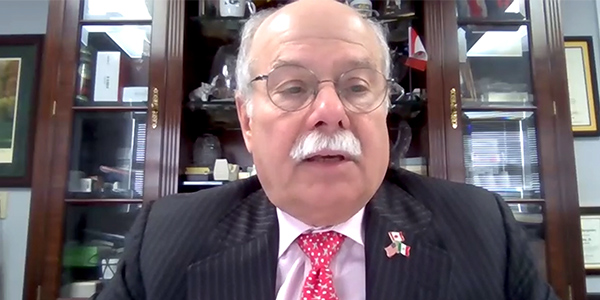Thursday’s meeting of NERC’s Member Representatives Committee (MRC) saw the unanimous re-election of Trustees Robin Manning and George Hawkins, as well as the approval of two new board members: former American Public Power Association CEO Sue Kelly, and Larry Irving, president and CEO of consulting firm The Irving Group. The new and returning trustees will serve three-year terms expiring in February 2024.
The Nominating Committee selected Kelly and Irving to fill the position of departing Trustee Jan Schori, who has served on the board for 12 consecutive years and is therefore ineligible for renomination. Kenneth DeFontes, who chaired the committee, said it decided to add an extra trustee in light of the “substantial work NERC will face over the next few years.”
DeFontes also replaced Roy Thilly as chair of NERC’s Board of Trustees at its meeting the same day, with Trustee Bob Clarke taking over from DeFontes as vice chair. Because Thilly will reach 12 years on the board in 2023, enlarging the class of 2024 will also ensure the additional trustee gains experience ahead of his departure. In addition, the board welcomed Kelly Hanson as NERC’s new senior vice president and chief administrative officer.
Presenting a resolution to honor Schori at the MRC meeting, Thilly joked that “it’s not surprising that Ken and his committee decided to find two people to fill Jan’s seat.”
Standards Actions
The board agreed unanimously to the following actions in accordance with Project 2018-03 (Standards efficiency review retirements):
- adopt reliability standard FAC-008-5 (Facility ratings) and file it with FERC;
- adopt the implementation plan, violation risk factors and violation severity levels for FAC-008-5; and
- retire FAC-008-3.
FAC-008-5 is a replacement for the proposed standard FAC-008-4, which was submitted to FERC in 2019 but remanded by the commission last year because of its planned retirement of FAC-008-3 Requirement R8. (See “Retirements to Streamline Standards,” FERC Accepts Removal of 18 NERC Requirements.) The new standard retains R8 but retires R7 as planned in FAC-008-4 and approved by FERC.
In addition, the board voted to withdraw the proposed CIP-002-6 (BES cyber system categorization). The withdrawal leaves the currently effective CIP-002-5.1 in place.
This standard was already before FERC, having been approved by the board last year. (See “Other Approvals,” NERC Board of Trustees/MRC Briefs: May 14, 2020.) However, NERC staff believed that “recent cybersecurity events and the evolving threat landscape” justify removing it from consideration to re-evaluate its impact on cybersecurity preparedness — in particular, its change to the criteria for categorizing control centers as medium-impact bulk electric system cyber systems.
Committee, RE Changes Accepted
Board members also accepted several actions by the board’s committees:
- approval of the 2021 work plans for the Standards Committee and the Compliance and Certification Committee;
- submittal of the 2020 year-end unaudited statement of activities from the Finance and Audit Committee (FAC);
- amendments to the mandates of the FAC and the Corporate Governance and Human Resources (CGHRC), Technology and Security, and Enterprise-Wide Risk Committees; and
- approval of the CGHRC’s policy on internal audit and corporate risk management.
The board also approved amendments to the bylaws of Texas Reliability Entity. The new bylaws are intended to provide greater scheduling flexibility for Board of Directors meetings and clarify member voting, and add an emergency governance section to allow for a smaller quorum of voting directors during an emergency. Changes to SERC Reliability’s Regional Reliability Standards Development Procedure were accepted as well.
Decisions Deferred on May, Aug. Meetings

Board and MRC members will have to wait until March 10 to find out whether their next meeting will be held online or in person, as the COVID-19 pandemic continues to impact organizations’ travel arrangements. The event is currently scheduled to take place May 12-13 in D.C.; Thilly said the board has yet to determine whether “any portion of it” can be done in person.
A decision on the third meeting of the year, planned for Aug. 11-12 in Vancouver, Canada, has also been delayed until “some time in spring.” In addition to pandemic concerns, Thilly said the “international location may create some additional complications.”
The board and MRC have not met in person since their February 2020 gatherings in Manhattan Beach, Calif. Earlier this year CEO Jim Robb said the successful shift to remote work over the past year has inspired NERC to consider a partially online format for future meetings, in which the February and August events would be open to stakeholders and accompanied by in-person meetings of the MRC, while the May and November meetings would be open to in-person attendance by board members only. Stakeholders could listen online, while the MRC would hold its meetings virtually. (See NERC Considering Long-term Virtual Board Meeting Format.)
The board asked for industry feedback on this straw proposal ahead of Thursday’s meeting. Robb admitted that the responses in the policy input package showed “no great consensus” on this specific plan but added that it was “clear that stakeholders recognize” the potential benefits of more virtual meetings, including flexibility in scheduling and the ability for a wider range of participants to take part.





